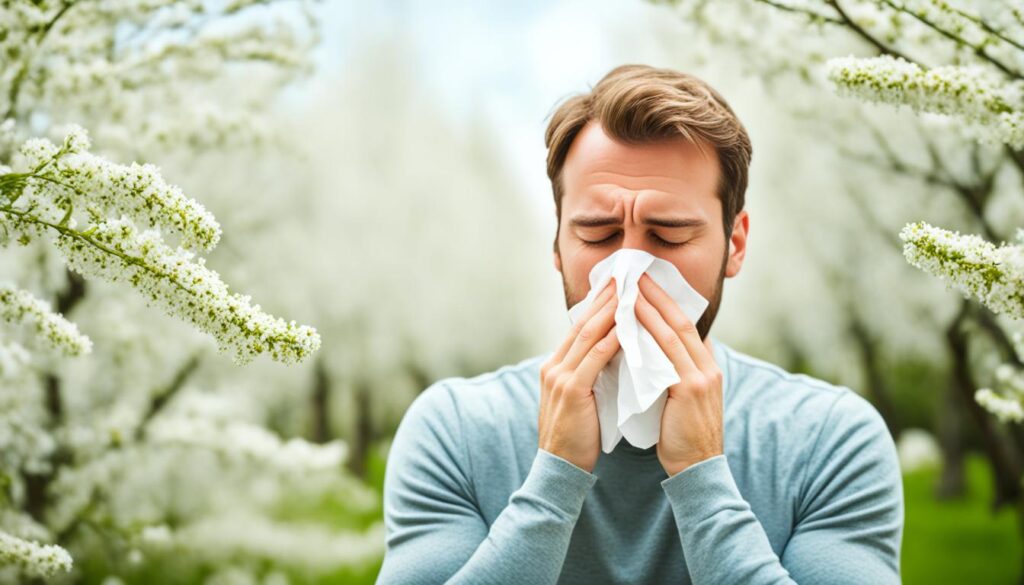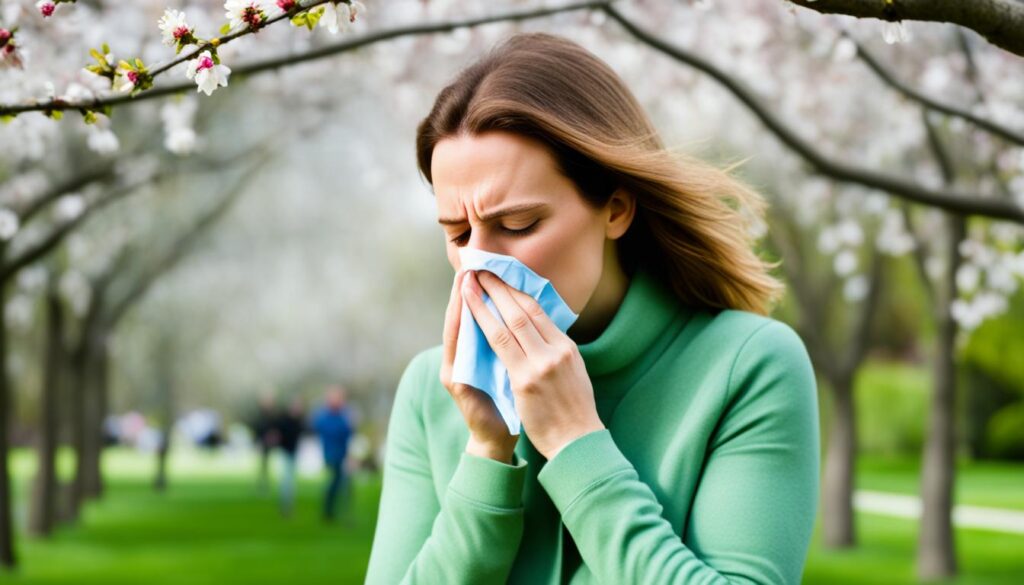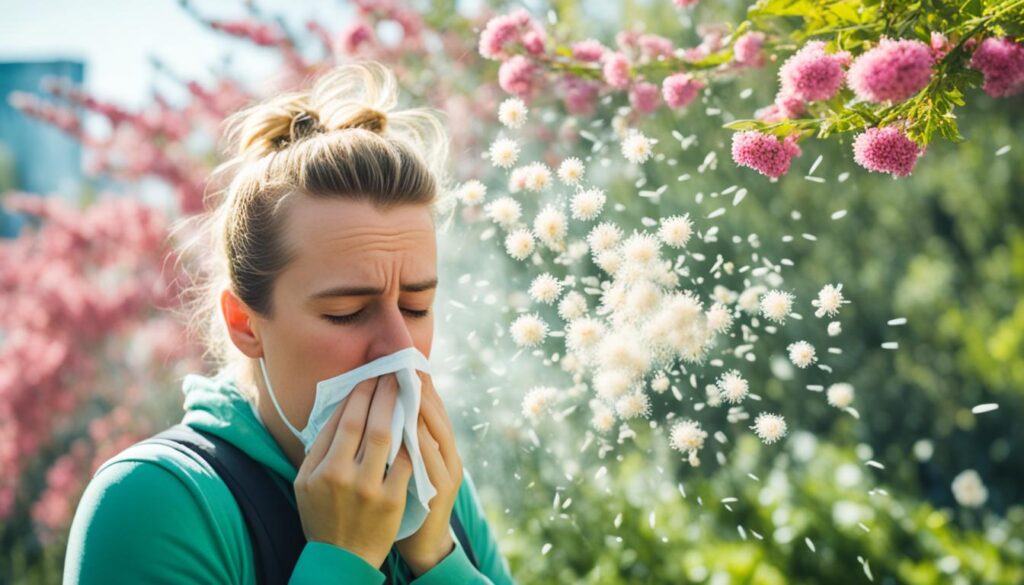In this article, I’ll share tips to help you feel better and breathe easier during allergy season. We’ll look at common allergy symptoms and the difference between seasonal and respiratory allergies. You’ll also learn about over-the-counter and natural remedies for relief. By the end, you’ll know how to manage your allergies and find relief.
Key Takeaways
- Discover effective strategies to alleviate allergy symptoms
- Understand the distinction between seasonal and respiratory allergies
- Explore over-the-counter medications and natural remedies for allergy relief
- Learn how to manage your allergies and find the relief you need
- Gain insights to help you breathe easier and feel better during peak allergy season
Understanding Allergy Symptoms
Allergy symptoms can vary but have some common signs. Knowing these signs is key to managing and treating allergies.
Identifying Nasal Congestion
Nasal congestion is a common allergy symptom. It happens when the nasal passages get inflamed and swell up. This makes it hard to breathe through the nose.
It can also make you feel like your sinuses are full and stuffy.
Recognizing Itchy Eyes and Runny Nose
Many people with allergies also get itchy eyes and a runny nose. The eyes might turn red, swell up, and get irritated. They can also make a lot of watery discharge.
A runny nose means you might have a lot of clear, thin mucus coming out of your nostrils. This can happen a lot and can’t be stopped.
| Symptom | Description |
|---|---|
| Nasal Congestion | Swollen, inflamed nasal passages leading to difficulty breathing through the nose and a feeling of sinus pressure |
| Itchy Eyes | Red, swollen, and irritated eyes, often accompanied by a watery discharge |
| Runny Nose | Constant, uncontrollable flow of clear, thin mucus from the nostrils |

Knowing these common allergy symptoms helps you figure out what’s bothering you. Then, you can find ways to feel better.
Seasonal vs. Respiratory Allergies
Allergies can be really tough and uncomfortable. Knowing the difference between seasonal and respiratory allergies helps find the right relief. Let’s look at what makes each type unique.
Seasonal Allergies
Seasonal allergies, also known as hay fever, come from things like pollen from trees, grasses, and weeds. These allergens are more common at certain times of the year. People with seasonal allergies might feel:
- Sneezing
- Itchy, watery eyes
- Nasal congestion
- Runny nose
Respiratory Allergies
Respiratory allergies are caused by things inside, like dust mites, pet dander, and mold. These allergies can happen any time of the year, not just during certain seasons. People with respiratory allergies might feel:
- Persistent nasal congestion
- Wheezing or difficulty breathing
- Chest tightness
- Coughing
| Seasonal Allergies | Respiratory Allergies |
|---|---|
| Triggered by outdoor allergens like pollen | Triggered by indoor allergens like dust mites and pet dander |
| Symptoms are typically cyclical, occurring during specific times of the year | Symptoms can occur year-round |
| Common symptoms include sneezing, itchy/watery eyes, and nasal congestion | Common symptoms include persistent nasal congestion, wheezing, and chest tightness |
It’s important to know the difference between seasonal and respiratory allergies to manage your symptoms well. Always talk to your healthcare provider to figure out what allergies you have and get the right treatment plan.

Over-the-Counter Allergy Medications
For quick relief from allergy symptoms, over-the-counter medications are a good choice. Antihistamines, decongestants, and nasal sprays are common treatments. They target different parts of the immune response.
Antihistamines: Combating Allergy Symptoms
Antihistamines block histamine receptors in the body. This reduces the inflammation that causes allergy symptoms. They help with itchy eyes, runny nose, and sneezing from various allergies.
Decongestants and Nasal Sprays
Decongestants and nasal sprays ease nasal congestion. They reduce swelling and inflammation in the nasal passages. Decongestants work throughout the body. Nasal sprays target the nose directly.
| Medication Type | How it Works | Common Examples |
|---|---|---|
| Antihistamines | Block histamine receptors, reducing inflammatory response | Cetirizine (Zyrtec), Loratadine (Claritin), Fexofenadine (Allegra) |
| Decongestants | Reduce swelling and inflammation in nasal passages | Pseudoephedrine (Sudafed), Phenylephrine (Advil Congestion Relief) |
| Nasal Sprays | Directly target and reduce nasal congestion | Oxymetazoline (Afrin), Fluticasone (Flonase) |
Always follow the instructions and dosage for these over-the-counter medications. Using them wrong can cause side effects or interact with other drugs. If your symptoms are severe or don’t get better, see a healthcare professional.

Natural Remedies for Allergy Relief
If you prefer a more natural way to handle allergies, there are herbal supplements and teas that can help. These options are a good choice if you want to avoid over-the-counter medicines. They can ease allergy symptoms without the harsh side effects.
Herbal Supplements for Allergy Relief
Herbal supplements like quercetin, butterbur, and stinging nettle can ease allergy symptoms. They work like antihistamines, helping with nasal congestion, sneezing, and itchy eyes. You can take these supplements as capsules or tinctures, making them a gentle choice.
Soothing Allergy Relief Teas
Certain teas can also help with allergies. Teas made from chamomile, ginger, and peppermint can reduce inflammation and help clear congestion. Drinking these teas often can be a simple way to manage allergies.
| Herbal Supplement | Potential Benefits for Allergy Relief |
|---|---|
| Quercetin | Powerful antioxidant with antihistamine effects, may reduce inflammation and swelling |
| Butterbur | Contains compounds that block histamine release, can help relieve nasal congestion and sneezing |
| Stinging Nettle | Anti-inflammatory properties, may help reduce symptoms like itchy eyes and runny nose |

“Herbal supplements and teas can provide a gentle, natural way to find allergy relief without the side effects of over-the-counter medications.”
Always talk to your healthcare provider before trying new supplements or herbal remedies for allergies. They can guide you on the right dosage and check for any medicine interactions.
Managing Pollen Allergies
Pollen is a big problem for people with seasonal allergies, causing many uncomfortable symptoms. I’ve dealt with pollen allergies myself and know how important it is to find ways to manage them. In this article, I’ll talk about how to cut down on pollen exposure and lessen its effects on your life.
Reducing Exposure to Pollen
Getting relief from pollen allergies means reducing how much pollen you breathe in. Here are some easy steps you can follow:
- Check the pollen levels and plan your outdoor time wisely. Use weather reports or pollen count apps to know when pollen is high.
- Keep your windows closed and use air conditioning to clean the air in your home and car. This stops pollen from getting inside.
- Wear a pollen mask or use a HEPA filter when you’re outside doing things that might expose you to a lot of pollen.
- Wash your hair before bed to get rid of pollen that stuck to you during the day.
- Think about getting a HEPA air purifier for your home. It catches pollen and other allergens, making the air cleaner.
By doing these things, you can greatly reduce your exposure to pollen. This will help you feel better from seasonal allergies.

“Reducing pollen exposure is key to managing seasonal allergies and finding the relief you deserve.”
Allergy-Proofing Your Home
Your home can greatly affect your allergy symptoms. By making your living space allergy-proof, you can feel better and breathe easier. Here, I’ll give you tips to make your home allergy-friendly.
Improve Indoor Air Quality
To reduce allergy triggers, improve your home’s air quality. Think about getting a top-notch air purifier to remove pollen, dust, and allergens. Make sure to change the filters often and keep it in good shape.
Maintain Cleanliness
- Vacuum often with a HEPA filter vacuum to catch allergens.
- Use a microfiber cloth to dust surfaces and stop dust and dust mites.
- Wash bedding, curtains, and fabrics in hot water to get rid of dust mites.
Minimize Moisture and Mold
Too much moisture can lead to mold, which is bad for allergies. Make sure bathrooms and kitchens have good ventilation. Fix any leaks or damp spots quickly to stop mold from growing.
Choose Allergy-Friendly Furnishings
When picking furniture and décor, go for materials that don’t hold onto allergens. Hardwood or tile floors are better than carpets, which can trap dust and pollen. Stay away from upholstered furniture and choose leather or synthetic ones instead.

Using these strategies to make your home allergy-proof can make it healthier and more comfy. It will help ease your allergy symptoms and boost your well-being.
Seeking Professional Help
Over-the-counter meds and natural remedies can help with allergy symptoms, but sometimes you need professional help. Talking to an allergist can really change how you manage your allergies.
When to See an Allergist
Knowing when to see an allergist can be hard. Here are some signs it’s time to get help:
- Your allergy symptoms keep coming back and affect your daily life, even with over-the-counter treatments.
- You have severe reactions or have had anaphylaxis before, which needs quick medical help.
- Your allergies are linked to other health issues, like sinus infections or asthma.
- You’ve tried different medicines but they don’t help much.
An allergist can figure out what’s causing your allergies and create a plan just for you. They might suggest immunotherapy to make you less sensitive to allergens over time.
| Reason to See an Allergist | Benefits of Seeking Professional Help |
|---|---|
| Persistent, unmanageable allergy symptoms | Precise diagnosis and customized treatment plan |
| Severe reactions or history of anaphylaxis | Specialized care and emergency management |
| Allergy symptoms with other health concerns | Comprehensive approach to address underlying issues |
| Lack of relief from over-the-counter medications | Access to prescription-strength treatments and immunotherapy |
If your allergies are really affecting your life, don’t wait to seek professional help. An allergist can give you the help and advice you need for lasting relief and better control over your allergies.

Managing Allergy Triggers
Finding out and managing your allergy triggers is key to long-term relief. I know how tough allergies can be from personal experience. It’s vital to know and avoid things that make your symptoms worse.
Common things that can trigger allergies include pollen, dust mites, pet dander, and some foods. Knowing what you’re allergic to helps you avoid it and manage your symptoms better.
Pollen Avoidance Strategies
If pollen is a big problem for you, here are some ways to cut down on exposure:
- Check the pollen count every day and plan your outdoor time wisely.
- Keep your windows shut and use air conditioning to clean the air in your home and car.
- Wash your hair before bed to get rid of pollen you picked up during the day.
Managing Dust Mite Allergens
Dust mites are another big allergy trigger. Here’s how to fight them:
- Put dust-proof covers on your mattress, box spring, and pillows.
- Clean and vacuum your home often, especially where dust tends to gather.
- Think about getting a HEPA air purifier to remove dust mites and other allergens from the air.
By figuring out and managing your allergy triggers, you can make big steps towards lasting relief. Remember, everyone’s allergies are different. Be patient and work with your doctor to find a plan that suits you.
| Common Allergy Trigger | Strategies for Avoidance |
|---|---|
| Pollen |
|
| Dust Mites |
|
“The key to managing allergies is understanding your triggers and taking proactive steps to minimize your exposure. With the right strategies, you can find lasting relief and regain control of your daily life.”
By tackling your allergy triggers directly, you can make big strides towards lasting relief and a better life. Remember, everyone’s allergies are different. Be patient and work with your doctor to create a plan that fits you.
Lifestyle Changes for Allergy Relief
Making some lifestyle changes can help ease allergy symptoms. Focus on your diet and exercise routine to manage your allergies better.
Diet and Exercise Considerations
Eating foods that fight inflammation can change the game for allergy sufferers. Foods packed with antioxidants, like berries, leafy greens, and fatty fish, can lessen inflammation. Also, skip processed foods and those loaded with saturated fats to reduce inflammation.
Exercise is key in fighting allergies. It boosts the immune system’s strength to tackle allergens. Try for 30 minutes of moderate exercise, like brisk walking or cycling, a few times a week. Just plan your workouts to dodge peak pollen times.
| Allergy-Fighting Foods | Allergy-Aggravating Foods |
|---|---|
|
|
These lifestyle changes let you take charge of your allergies and find relief. Since everyone’s body is unique, try different diets and exercises to see what works for you.

“Lifestyle changes can be a powerful complement to traditional allergy treatments, helping you feel better and take control of your symptoms.”
Allergy Relief for Children
Allergies can affect children just like adults. When looking for allergy relief for children, it’s key to think about their special needs. We’ll look at ways to ease allergy symptoms in kids, from picking the right medicines to managing their allergies well.
Choosing the Right Allergy Medications
Choosing the right allergy relief for children means picking medicines that are safe and right for their age. Kids can use antihistamines like cetirizine or loratadine to help with stuffy noses, itchy eyes, and other allergy issues. Always talk to a pediatrician to get the right dose and how to use it.
Managing Allergy Triggers
To help kids with allergies, it’s important to reduce their exposure to things that trigger allergies. Here’s how you can help your child:
- Keep windows closed and use air conditioning to cut down on pollen.
- Vacuum and dust often to keep your home free of dust mites and other allergens.
- Remind your child to wash their hands a lot, especially after playing outside.
These steps can help reduce allergy problems and make your child more comfortable.
Incorporating Natural Remedies
There are also natural ways to help with allergy relief for children. Things like butterbur or quercetin might help ease allergy symptoms. Teas made from chamomile or peppermint can also soothe your child. But, always talk to a doctor before trying new supplements or remedies for kids.
By knowing how to help kids with allergies, parents and caregivers can find safe and effective ways to ease their symptoms. Using a mix of the right medicines, controlling the environment, and natural remedies can make life better for children with allergies.

Traveling with Allergies
Traveling with allergies can seem tough, but with the right steps, you can still enjoy your trips. Whether it’s a short weekend away or a long vacation, these tips will make your travel allergy-friendly.
Preparing for Allergy-Friendly Trips
Before you go, research your destination and plan ahead. Traveling with allergies means you need to plan a bit more. But, it’s worth it to avoid allergens and stay comfortable.
- Pack essential allergy medications: Don’t forget your antihistamines, nasal sprays, and other needed meds.
- Research allergen levels: Look up pollen counts and air quality to know what to expect.
- Identify allergy-friendly lodging: Choose hotels or rentals with hypoallergenic bedding and no pets.
- Prepare for dining: Find restaurants that can handle food allergies and bring your own snacks.
- Pack cleaning supplies: Bring your own bedding and air purifiers to keep your space safe.
By planning ahead, you can travel with allergies without worry. You’ll be free to enjoy your trip and make great memories.
| Allergy-Friendly Travel Tips | Description |
|---|---|
| Research Destination | Check pollen counts, air quality, and potential allergen triggers to prepare for your trip. |
| Pack Essentials | Bring your allergy medications, hypoallergenic bedding, and cleaning supplies to create a safe environment. |
| Identify Allergy-Friendly Accommodations | Look for hotels or vacation rentals that cater to travelers with allergies. |
| Plan Allergy-Friendly Dining | Research restaurants that accommodate food allergies and pack your own snacks. |
Follow these steps to travel with allergies confidently. You’ll enjoy your journey more, without worrying about your allergies.
Conclusion
Understanding your allergy symptoms helps you find relief. You can try over-the-counter antihistamines or natural remedies. This way, you can improve your life, even when allergies are at their worst.
If your symptoms don’t get better or get worse, see a healthcare professional. They can give you advice that fits your needs.
By making lifestyle changes and taking steps to avoid allergens, you can manage your allergies better. Talking to your doctor and getting their advice is key. This way, you can handle allergies with confidence and feel better overall.
Using a holistic approach to allergy relief helps you deal with symptoms and the causes. Always be alert, keep learning, and ask for help when you need it. With the right steps, you can overcome allergy issues and live well, even with seasonal or environmental challenges.






Leave feedback about this